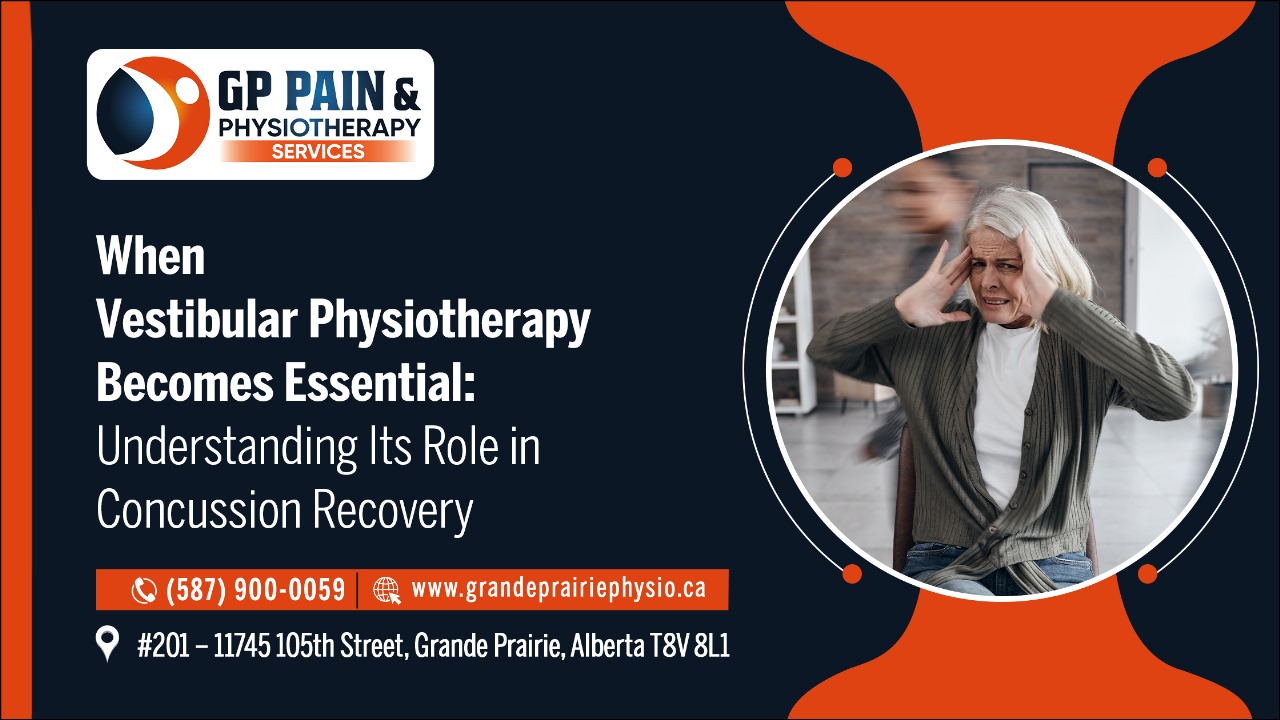Vestibular physiotherapy, also called vestibular rehabilitation therapy, is aimed at treating balance and dizziness disorders related to the vestibular system. The vestibular system comprises intricate structures located in both the inner ear and the brain, playing a vital role in regulating balance and spatial orientation. Vestibular physiotherapy in Grande Prairie aims to help individuals regain confidence in their balance and mobility, ultimately improving their quality of life.
When Vestibular Physiotherapy Becomes Essential:
Vestibular physiotherapy becomes essential when individuals experience symptoms related to balance and dizziness that significantly impact their daily activities and quality of life. Here are some scenarios where vestibular physiotherapy may be necessary:
Vertigo and Dizziness:
Persistent sensations of spinning or dizziness can be debilitating and may indicate underlying vestibular dysfunction. If these symptoms occur frequently or severely, especially with changes in head position or movement, vestibular physiotherapy can help manage and reduce these symptoms. Dizziness physiotherapy is aimed at diagnosing and treating dizziness and balance disorders, which can contribute to feelings of dizziness, unsteadiness, and related symptoms.
Imbalance and Fall Risk:
Individuals who have difficulty maintaining stability, experience frequent falls, or have an increased risk of falls due to balance impairments can benefit from vestibular rehabilitation. Physiotherapy interventions can improve balance, coordination, and proprioception, thereby minimizing the risk of falls and related injuries.
Benign Paroxysmal Positional Vertigo (BPPV):
This is a common vestibular disorder distinguished by short episodes of vertigo induced by particular head movements. Vertigo physiotherapy includes canalith repositioning maneuvers, such as the Epley maneuver or Semont maneuver, which can effectively treat BPPV by repositioning displaced inner ear crystals.
Vestibular Neuritis and Labyrinthitis:
These conditions involve inflammation or infection of the vestibular nerve or structures within the inner ear, resulting in vertigo, dizziness, and balance problems. Vestibular physiotherapy in Grande Prairie aims to help individuals compensate for vestibular deficits and restore functional balance through targeted exercises and maneuvers.
Meniere’s Disease:
It is a chronic inner ear disorder characterized by episodes of vertigo, hearing loss, tinnitus, and ear fullness. Vestibular physiotherapy can assist in managing symptoms and improving overall balance and stability, helping individuals cope better with the condition’s challenges.
Post-Concussion Syndrome:
Following the occurrence of a concussion or mild traumatic brain injury, individuals may experience vestibular dysfunction, leading to dizziness, imbalance, and visual disturbances. Vestibular rehabilitation is an essential component of comprehensive concussion management, helping individuals recover functional balance and reduce persistent symptoms.
Age-Related Balance Disorders:
As people age, they may experience declines in vestibular function, muscle strength, and proprioception, increasing their risk of falls. Vestibular physiotherapy can address age-related balance impairments and help older adults maintain independence and mobility.
Understanding Physiotherapy’s Role in Concussion Recovery:
Vestibular physiotherapy plays a significant role in concussion recovery by addressing symptoms related to vestibular dysfunction, which commonly occurs after a concussion or mild traumatic brain injury (TBI). The inner ear houses the vestibular system, which plays a crucial role in preserving balance and spatial awareness. When a concussion disrupts this system, it can result in symptoms like dizziness, vertigo, unsteadiness, and visual issues. Here’s how vestibular physiotherapy contributes to concussion recovery:
Gaze Stabilization:
Vision can be affected by vestibular dysfunction, leading to difficulties with focusing and tracking objects, especially during head movements. Vestibular physiotherapy incorporates gaze stabilization exercises to enhance the synchronization of eye movements with head movements, helping individuals maintain visual stability and reduce symptoms like dizziness and disorientation.
Vestibulo-ocular Reflex (VOR) Rehabilitation:
The VOR is responsible for stabilizing vision during head movements. Following a concussion, the VOR may be impaired, resulting in symptoms like blurry vision and challenges in sustaining focus. Vestibular physiotherapy includes exercises to recalibrate the VOR, such as head turns and visual tracking tasks, to improve visual stability and reduce symptoms.
Cervical Spine Management:
Neck injuries commonly accompany concussions and can contribute to vestibular symptoms. Vestibular physiotherapy may involve exercises to improve neck mobility, strength, and proprioception, which can help reduce symptoms and facilitate recovery.
Gradual Return to Activity:
Vestibular physiotherapy incorporates a gradual return-to-activity protocol, allowing individuals to safely reintegrate into daily activities, work, and sports. Therapists monitor progress closely and adjust the rehabilitation program based on the individual’s response and symptom severity.
Education and Counseling:
Vestibular physiotherapy in Grande Prairie provides education and counseling to individuals and their families about concussion symptoms, recovery expectations, and strategies to manage symptoms in daily life. This empowers individuals to participate actively in their recovery process and make well-informed choices regarding their rehabilitation.
Empowering Recovery:
Through personalized interventions and education, GP Pain Physiotherapy in Grande Prairie supports individuals throughout their recovery journey, empowering them to navigate the challenges of post-concussion symptoms with confidence and resilience.
Vestibular physiotherapy plays a huge role in the comprehensive management of concussions by addressing vestibular dysfunction and associated symptoms. By focusing on symptom management, balance rehabilitation, gaze stabilization, VOR recalibration, cervical spine management, and gradual return-to-activity protocols, vestibular physiotherapy helps individuals regain their functional independence and quality of life following a concussion. As a fundamental component of concussion rehabilitation, vestibular physiotherapy contributes significantly to optimizing outcomes and promoting long-term recovery for individuals affected by concussions.
